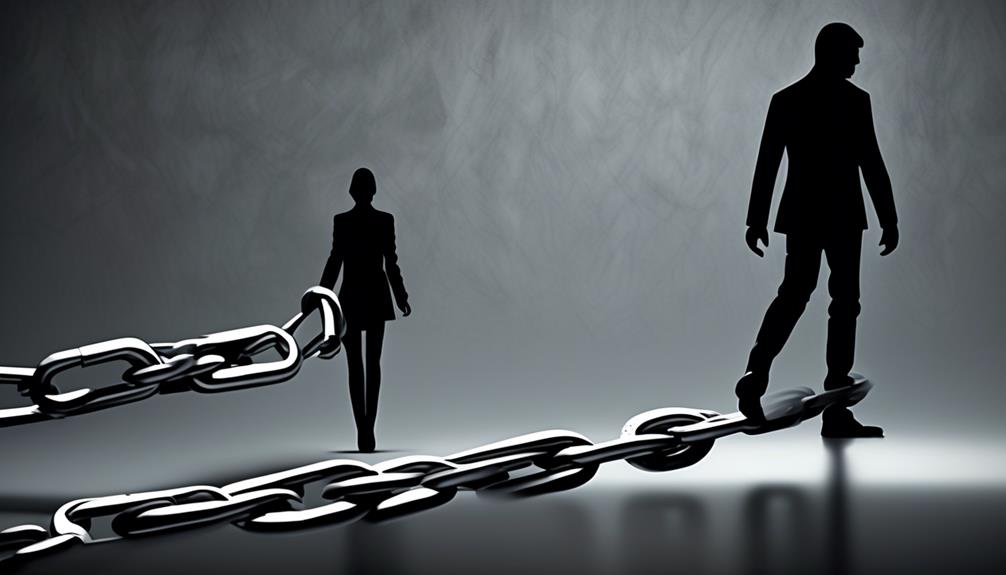Picture a nuanced interaction between two individuals, where one consistently seeks validation while the other craves respect. This complex relationship between a codependent individual and a narcissist unveils a labyrinth of intertwined emotions and behaviors, which are simultaneously perplexing and moving.
As we explore the intricacies of this dynamic, we shed light on the underlying motivations and consequences that shape these relationships. Unraveling the layers of this intricate dance may offer insights that challenge our perceptions and invite a deeper understanding of the human psyche in the context of intimate connections.
Key Takeaways
- Codependents blame themselves and feel inadequate after narcissistic cheating.
- Therapy and support systems are crucial for codependents to heal from infidelity.
- Setting clear boundaries and developing healthier coping mechanisms are important in recovery.
- Recognizing and addressing codependent behaviors is essential for healing emotional wounds.
Understanding Codependency and Narcissism Dynamics
In navigating the complex interplay between codependency and narcissism, we uncover profound insights into the intricate dynamics of these relational patterns. Codependents, driven by a deep need for validation and approval, often find themselves entangled with a narcissistic partner who exudes an excessive sense of entitlement. This dynamic sets the stage for a tumultuous relationship where boundaries become blurred, and manipulation thrives.
Codependents, struggling to assert their own needs and desires, can inadvertently enable the narcissistic partner's controlling behaviors. Meanwhile, the narcissist, lacking empathy, sees the codependent as a prime target for manipulation. The codependent's self-worth becomes intertwined with the relationship, while the narcissist thrives on the constant validation provided by their partner.
For codependents, being in a relationship with a narcissistic partner can be emotionally devastating. The constant erosion of self-esteem and mental well-being takes a toll, leaving them feeling trapped in a cycle of seeking validation from a partner who's unable to provide genuine emotional support.
Impact of Narcissistic Cheating on Codependents

Navigating the intricate dynamics of codependency and narcissism sheds light on the profound impact narcissistic cheating has on codependents' emotional well-being and self-esteem. When in a relationship with a narcissist, codependents often find themselves deeply hurt and emotionally devastated by the infidelity. Blaming themselves for the cheating can exacerbate their already fragile self-esteem, leading to feelings of inadequacy and unworthiness. The manipulative tactics employed by narcissists, such as gaslighting and devaluation, further erode the codependent's mental well-being, leaving them feeling trapped and powerless.
One of the challenges codependents face is setting boundaries. Struggling to establish and enforce boundaries allows the narcissist to continue their cheating behavior unchecked, perpetuating the cycle of emotional abuse. Seeking therapy and building a support system are crucial steps for codependents to cope with the impact of narcissistic cheating and begin the healing process. By recognizing their worth and learning to prioritize their own well-being, codependents can gradually break free from the toxic cycle and regain their sense of self.
Coping Strategies for Codependent Cheating
When coping with codependent cheating, seeking therapy to address underlying patterns and developing healthier coping mechanisms is a crucial first step towards healing and self-discovery.
It's essential to recognize the impact of codependency and narcissism in relationships and take proactive steps to safeguard your emotional well-being.
Here are some effective coping strategies for codependent cheating:
- Seek Therapy: Professional guidance can help you unravel the complexities of codependency and narcissism, empowering you to break free from destructive relationship dynamics.
- Practice Self-Care: Prioritize your own needs and nurture yourself physically, emotionally, and mentally to regain a sense of self-worth and resilience.
- Set Boundaries: Establish clear boundaries in relationships to protect yourself from further harm, asserting your needs and values without compromising your well-being.
Recovery From Codependent Cheating

Having understood the coping strategies for codependent cheating, the journey towards recovery from such a challenging experience begins with acknowledging the impact of codependency and taking proactive steps towards healing and self-discovery.
It's essential to recognize that codependent behavior often stems from deep-rooted patterns that may have been exacerbated by a relationship with someone exhibiting narcissistic personality disorder traits. Seeking therapy or counseling is a crucial step in unraveling the feelings of guilt, shame, and betrayal that may have surfaced due to the cheating episode.
Through therapy, one can work on addressing the underlying codependent behaviors that led to this situation, ultimately paving the way for personal growth and emotional healing. Embracing self-care and self-love becomes paramount in the recovery process, allowing individuals to prioritize their own needs and well-being while setting and maintaining healthy boundaries in all relationships.
Surrounding oneself with a supportive network of understanding friends and loved ones can provide the encouragement and validation needed to navigate this challenging journey towards recovery.
Healing Emotional Wounds and Patterns
To embark on the journey of healing emotional wounds and patterns, it's crucial to first recognize and acknowledge the impact of codependent behaviors on our overall well-being. Codependency can deeply affect our mental health, leading to a cycle of unhealthy relationships and patterns that hinder our personal growth.
In order to break free from these destructive cycles, we must take proactive steps towards healing and self-discovery.
Key Steps for Healing Emotional Wounds and Patterns:
- Acknowledge the Patterns: Understanding and acknowledging our codependent behaviors is the first step towards healing emotional wounds and fostering mental wellness.
- Therapeutic Support: Seeking therapy or counseling can help address underlying emotional wounds, providing tools to develop healthier coping strategies and cultivate self-awareness.
- Self-Care Practices: Prioritizing self-care and setting boundaries are essential for nurturing our mental health and building resilience against codependent tendencies.
Frequently Asked Questions
Do Narcissists Care if You Cheat on Them?
We believe narcissists may not care if you cheat on them due to their self-centered nature. They often prioritize their own desires over others' feelings. This behavior can stem from their need for control and manipulation in relationships.
In some cases, cheating mightn't faze a narcissist as it aligns with their belief in their superiority. It's essential to understand these dynamics to navigate relationships with narcissistic individuals.
How Do Narcissists Act When Confronted About Cheating?
When confronted about cheating, narcissists often employ manipulation tactics like denial, deflection, or gaslighting. They may become defensive and shift blame onto the partner, accusing them of infidelity. By minimizing their actions and using charm or love bombing, they aim to distract and regain control.
Refusing responsibility, they avoid meaningful conversations or resolution. This behavior can leave the partner questioning their own perceptions and feeling invalidated.
Why Do Codependents Have Affairs?
We believe codependents may have affairs as a way to fill emotional voids or seek validation outside their primary relationship. Feeling unfulfilled or seeking excitement could lead to this behavior. Struggles with setting boundaries and asserting needs might contribute to infidelity.
Being attracted to narcissists could also play a role, as they may provide a sense of purpose and validation. It's complex, and we empathize with the challenges they face.
How Do You Deal With Being Cheated on by a Narcissist?
Dealing with being cheated on by a narcissist is challenging. It shakes us to our core, testing our resilience and self-worth.
We must lean on our support system, seek therapy, and set clear boundaries. Understanding the dynamics at play helps us navigate the emotional turmoil.
It's crucial to prioritize our well-being, rebuild our confidence, and break free from toxic patterns. Healing takes time, but with patience and self-care, we can emerge stronger.
Conclusion
In conclusion, navigating the tumultuous waters of codependent cheating on a narcissist requires introspection, support, and resilience. Just as the Phoenix rises from the ashes, we too can emerge stronger and wiser from the depths of our struggles.
By acknowledging our patterns, seeking help, and prioritizing our own well-being, we can break free from the cycle of dysfunction and pave a path towards healing and self-discovery.
Remember, our journey towards liberation and self-love is worth every step.










